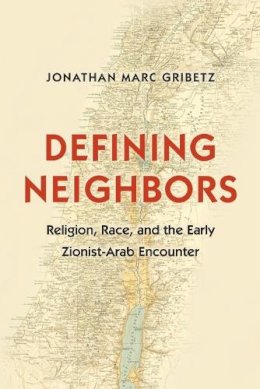
Stock image for illustration purposes only - book cover, edition or condition may vary.
Defining Neighbors: Religion, Race, and the Early Zionist-Arab Encounter
Jonathan Marc Gribetz
€ 50.43
FREE Delivery in Ireland
Description for Defining Neighbors: Religion, Race, and the Early Zionist-Arab Encounter
Paperback. Series: Jews, Christians and Muslims from the Ancient to the Modern World. Num Pages: 312 pages, black & white illustrations. BIC Classification: 1FBH; 1FBP; HBJF1; JFSR1; JFSR2; JPFN. Category: (P) Professional & Vocational; (U) Tertiary Education (US: College). Dimension: 157 x 234 x 26. Weight in Grams: 492.
As the Israeli-Palestinian conflict persists, aspiring peacemakers continue to search for the precise territorial dividing line that will satisfy both Israeli and Palestinian nationalist demands. The prevailing view assumes that this struggle is nothing more than a dispute over real estate. Defining Neighbors boldly challenges this view, shedding new light on how Zionists and Arabs understood each other in the earliest years of Zionist settlement in Palestine and suggesting that the current singular focus on boundaries misses key elements of the conflict. Drawing on archival documents as well as newspapers and other print media from the final decades of Ottoman rule, Jonathan Gribetz argues that Zionists and Arabs in pre-World War I Palestine and the broader Middle East did not think of one another or interpret each other's actions primarily in terms of territory or nationalism. Rather, they tended to view their neighbors in religious terms--as Jews, Christians, or Muslims--or as members of "scientifically" defined races--Jewish, Arab, Semitic, or otherwise. Gribetz shows how these communities perceived one another, not as strangers vying for possession of a land that each regarded as exclusively their own, but rather as deeply familiar, if at times mythologized or distorted, others. Overturning conventional wisdom about the origins of the Israeli-Palestinian conflict, Gribetz demonstrates how the seemingly intractable nationalist contest in Israel and Palestine was, at its start, conceived of in very different terms. Courageous and deeply compelling, Defining Neighbors is a landmark book that fundamentally recasts our understanding of the modern Jewish-Arab encounter and of the Middle East conflict today.
Product Details
Format
Paperback
Publication date
2016
Publisher
Princeton University Press
Condition
New
Series
Jews, Christians and Muslims from the Ancient to the Modern World
Number of Pages
312
Place of Publication
New Jersey, United States
ISBN
9780691173467
SKU
V9780691173467
Shipping Time
Usually ships in 7 to 11 working days
Ref
99-1
About Jonathan Marc Gribetz
Jonathan Marc Gribetz is assistant professor of Near Eastern studies and Judaic studies at Princeton University.
Reviews for Defining Neighbors: Religion, Race, and the Early Zionist-Arab Encounter
One of Choice's Outstanding Academic Titles for 2015 "[F]ortuitously for readers, Gribertz's work contextualize(s) a present-day shift toward religious rhetoric, symbols, and organizations in the conflict. He shows that religion was once central for Jews and Arabs seeking to understand each other, and that nationality is in fact a latecomer to that encounter. But more importantly, he shows that a religious encounter need not mean a holy war."
Raphael Magarik, Haaretz "An essential contribution to the growing conversation."
Noah Haiduc-Dale, H-Net Reviews "In the ever-growing and highly saturated field of Arab-Israeli conflict studies, it is rare for a book to break new ground and challenge long-held and well-entrenched perceptions. This is one of those rare exceptions."
Choice "[A] field-changing new book... Indeed, such a sensitive treatment of historical texts, in light of multiple political contexts, geographic frames, and religious and cultural discourses should serve as a model for many historians working to interpret, categorize, and contextualize the texts they encounter
and for all those who study how changing circumstances change the terms of discourse and lead to mutual understanding or misunderstanding."
Jewish History "Gribetz's fascinating book makes a major contribution to the literature on early Zionist-Arab encounters, in particular, and to the intellectual history of late Ottoman Palestine and the Levant, more generally."
AJS Review
Raphael Magarik, Haaretz "An essential contribution to the growing conversation."
Noah Haiduc-Dale, H-Net Reviews "In the ever-growing and highly saturated field of Arab-Israeli conflict studies, it is rare for a book to break new ground and challenge long-held and well-entrenched perceptions. This is one of those rare exceptions."
Choice "[A] field-changing new book... Indeed, such a sensitive treatment of historical texts, in light of multiple political contexts, geographic frames, and religious and cultural discourses should serve as a model for many historians working to interpret, categorize, and contextualize the texts they encounter
and for all those who study how changing circumstances change the terms of discourse and lead to mutual understanding or misunderstanding."
Jewish History "Gribetz's fascinating book makes a major contribution to the literature on early Zionist-Arab encounters, in particular, and to the intellectual history of late Ottoman Palestine and the Levant, more generally."
AJS Review
